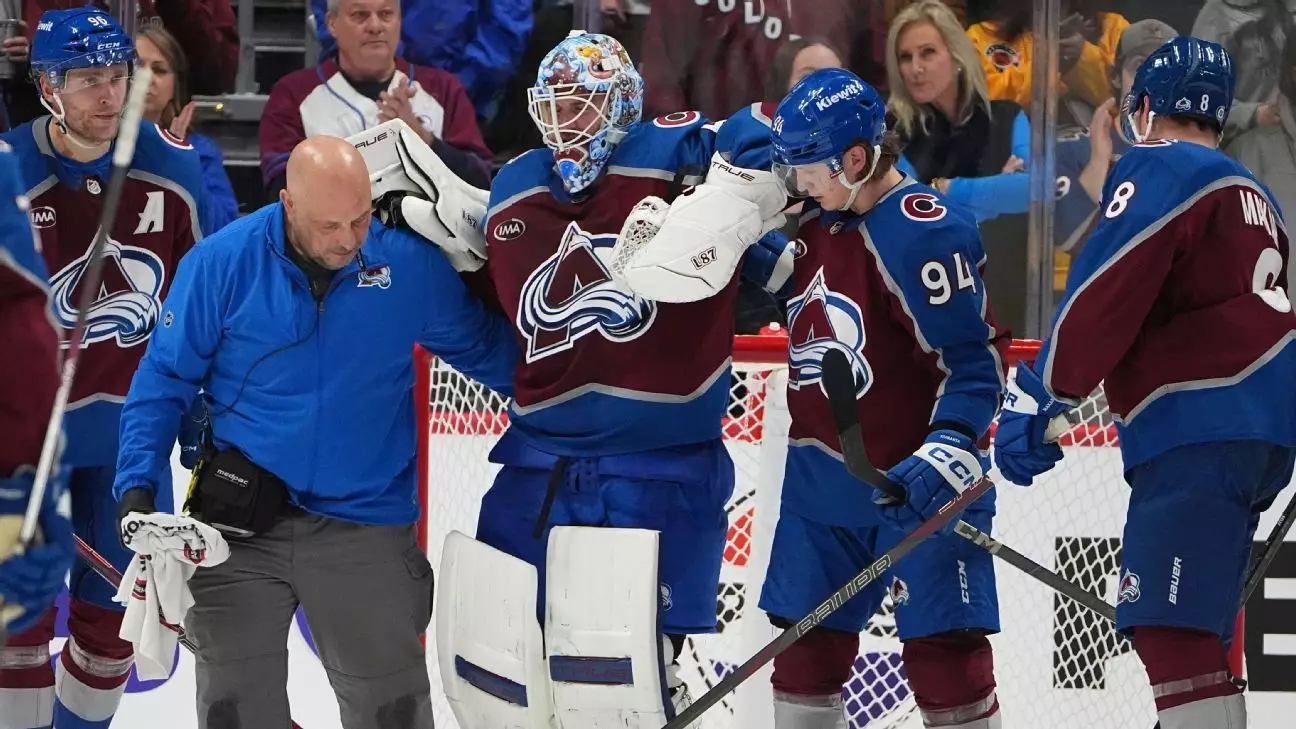The sports world is no stranger to controversy, but seldom does a single incident rattle the established norms of player safety and officiating as starkly as what occurred during the recent Colorado Avalanche versus Buffalo Sabres matchup. Avalanche head coach Jared Bednar’s ire following a game-winning overtime display exemplifies the tension between the competitive spirit of sports and the enforcement—or lack thereof—of critical player protection protocols.
In the closing stages of the third period, a series of unfortunate events unfolded that would leave Bednar seething. The incident began with Sabres forward Zach Benson colliding with Avalanche center Parker Kelly, resulting in Benson crashing into Avalanche goaltender Scott Wedgewood. The fallout? Wedgewood lay prostrate on the ice, seemingly incapacitated while the play continued unabated. In an unforgiving twist, the Sabres capitalized on the moment and scored, igniting a firestorm of frustration from the Avalanche bench.
Bednar’s vehement assertion that the play should have been stopped is grounded not just in the emotional heat of the moment but in a broader philosophical framework regarding the safety of players. “If he’s hurt and he’s not getting up… the whistle should go,” Bednar stated, demonstrating a level of urgency that reflects larger discussions occurring within sports leagues across the globe. The question remains: how far are officials willing to go to ensure player welfare in pursuit of the game’s flow?
Player Safety vs. Game Integrity
Bednar’s frustration illustrates the precarious balancing act that officials must execute: maintaining the integrity of the game while prioritizing player safety. The official’s refusal to blow the whistle, citing the nature of the play—where Benson was pushed into Wedgewood—raises critical questions about accountability. “I said, ‘I don’t give a s—. He’s hurt,'” Bednar fired back, implying that regardless of the circumstances surrounding the collision, the health of the player must invariably take precedence.
This incident is a microcosm of a larger issue that has plagued professional sports—decisions often being scrutinized after the fact without immediate corrective action. Does the rule that a whistle must only be blown under specific conditions render player safety secondary? In a league that touts itself as prioritizing player wellness, Bednar’s and many fans’ outrage is poignant, illuminating perceived cracks in that promise.
As much as Bednar might wish for immediate reform, it is evident that the dialogue surrounding officiating practices and player safety is ongoing. His decision to challenge the goal for goaltender interference not only indicates a strategic move but also a desperate interpretative exercise in exposing the flaws in officiating. “It gives them another chance to do the right thing,” he noted, signaling that compliance with existing rules is often disregarded—or interpreted flexibly—at the officials’ discretion.
The NHL is not a stranger to scrutiny, and Bednar acknowledged that he expected communication from the league following the incident. This begs the question of what accountability truly looks like for a league that is still in the throes of reform. Will Bednar’s voice be part of a larger chorus calling for change, or will it be drowned out by the NFL’s perennial focus on maintaining game pace amid a backdrop of increasing violence within the sport?
The Aftermath: Resilience Amid Adversity
Despite the drama, the Avalanche showcased a fortitude that speaks to their team character. The comeback victory stands as a testament to their resilience, with Jonathan Drouin and Devon Toews providing the crucial plays to secure the win. However, amidst celebratory statements about triumph, one cannot overlook the underlying concern about Wedgewood’s health; his future role on the team is now uncertain, leading to potential strategic shifts moving forward.
Through all the highs and lows, the Avalanche’s narrative remains intertwined with the bigger questions pertaining to safety and officiating in sports. Ultimately, conflicts like these beckon a call for a reevaluation of rules and practices to safeguard not only the integrity of the game but the very players who elevate it. Indeed, Bednar’s frustrations might ultimately be the catalyst needed to inspire meaningful change within the league, setting a precedent for a safer and more equitable sporting environment.

